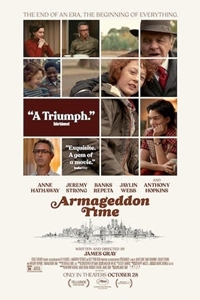Armageddon Time (R) ★★½
 Everyone has their own coming-of-age story. For most, it has meaning for only one person; it's rare that a coming-of-age experience translates into a universal story. Kenneth Branagh's Belfast is an example of one that does. James Gray's Armageddon Time is one that doesn't. It's not that there's anything fundamentally wrong with the film. Some of the individual moments are impactful or effective at evoking nostalgia. But, as they say, the whole is less than the sum of the parts. It feels like a watered-down replica of other, better coming-of-age stories. It's a little slow and indulgent. And the performances are a notch below what we have come to expect from the likes of Anne Hathaway (who's merely okay), Jeremy Strong (who's good but not great), and Anthony Hopkins (who's far from being in Oscar form - compare him to Belfast's Ciaran Hinds, who had a similar role).
Everyone has their own coming-of-age story. For most, it has meaning for only one person; it's rare that a coming-of-age experience translates into a universal story. Kenneth Branagh's Belfast is an example of one that does. James Gray's Armageddon Time is one that doesn't. It's not that there's anything fundamentally wrong with the film. Some of the individual moments are impactful or effective at evoking nostalgia. But, as they say, the whole is less than the sum of the parts. It feels like a watered-down replica of other, better coming-of-age stories. It's a little slow and indulgent. And the performances are a notch below what we have come to expect from the likes of Anne Hathaway (who's merely okay), Jeremy Strong (who's good but not great), and Anthony Hopkins (who's far from being in Oscar form - compare him to Belfast's Ciaran Hinds, who had a similar role).
Those three luminaries have supporting roles. The lead goes to Banks Repata, whose resume is thin (as one might expect from someone his age). He does a good job playing an ineffectual protagonist - the kind of person who is entirely reactive. Events happen around him and things happen to him; he never seizes control of the narrative. This might be true-to-life to Gray's experiences but it can be frustrating to watch as a movie viewer.
It's 1980 in Queens, New York and Paul Graff (Repata) is entering sixth grade. On the first day of school, he is singled out by a no-nonsense teacher, Mr. Turkeltaub (Andrew Polk), as a troublemaker. But he's not the only one. Turkeltaub, perhaps possessing more than a racist bone or two, also picks on Johnny Davis (Jaylin Webb) who, in addition to repeating the grade, is the only black kid in the class. Paul and Johnny become as thick as thieves (literally), taking turns getting themselves into trouble while always having each other's back.
Meanwhile, things aren't going smoothly at home, either. Paul's mother, Esther (Anne Hathaway), the president of the PTA, is often distracted. His older brother, Ted (Ryan Sell), picks on him mercilessly. His father, Irving (Jeremy Strong), despite generally seeming like a decent sort of dad, has a volcanic temper that results in vicious beatings when it flares. The only relative with whom Paul has a good relationship is his mother's father, Aaron Rabinowitz (Hopkins), who speaks to him like an adult, takes time to actually listen, and doles out life lessons (sometimes with a dose of profanity to make them more memorable).
For the most part, Armageddon Time functions as a college of memories. Some may be enhanced, some may be entirely fictional, and some may be real - all are seamlessly blended together. The movie addresses racism in multiple forms and guises (especially the sometimes subtle antisemitism directed at Paul's family and the overt bigotry leveled at Johnny). There's a telling scene in which peer pressure compels Paul to downplay his friendship with Johnny; this is followed by a dressing-down by Grandpa who, having lived through the ‘30s and ‘40s, knows how that can play out.
One curious element of Armageddon Time involves a dual cameo during the film's second half. After Paul changes schools to attend an expensive private venue, he comes into contact with an authoritarian figure who offers an ambiguous bit of advice. Played by John Diehl, this individual is revealed to be Fred Trump, the father of future president Donald Trump. The speaker at the day's assembly is Maryanne Trump (Donald's sister, played by Jessica Chastain). Although these encounters may have happened, they do not advance the story and are not referenced again. This appears to be the cinematic equivalent of "name-dropping" and is distracting, especially when one considers how polarizing the name "Trump" has become.
The film's release date hints at Oscar aspirations but it's hard to argue in favor of Armageddon Time being worthy in any category. Although it would be overly harsh to say that Gray's movie was made with an audience of one in mind, this feels more like a streaming option than a theatrical destination selection.
To get the full Quicklook Films experience, uncheck "Enable on this Site" from Adblock Plus
box office top 10

Civil War Released: April 12, 2024 Cast: Kirsten Dunst, Wagner Moura 11.1M

Abigail Released: April 19, 2024 Cast: Melissa Barrera, Dan Stevens 10.2M

Godzilla x Kong: The New Empire Released: March 29, 2024 Cast: Rebecca Hall, Brian Tyree Henry 9.5M

The Ministry of Ungentlemanly Warfare Released: April 19, 2024 Cast: Henry Cavill, Eiza Gonzalez 9M

Spy x Family Code: White Released: April 19, 2024 Cast: Takuya Eguchi, Saori Hayami 4.9M

Kung Fu Panda 4 Released: March 8, 2024 Cast: Jack Black, Viola Davis 4.6M

Ghostbusters: Frozen Empire Released: March 22, 2024 Cast: Paul Rudd, Carrie Coon 4.4M

Dune: Part Two Released: March 1, 2024 Cast: Timothée Chalamet, Rebecca Ferguson 2.9M

Monkey Man Released: April 5, 2024 Cast: Dev Patel, Sikandar Kher 2.2M

The First Omen Released: April 5, 2024 Cast: Nell Tiger Free, Bill Nighy 1.7M






